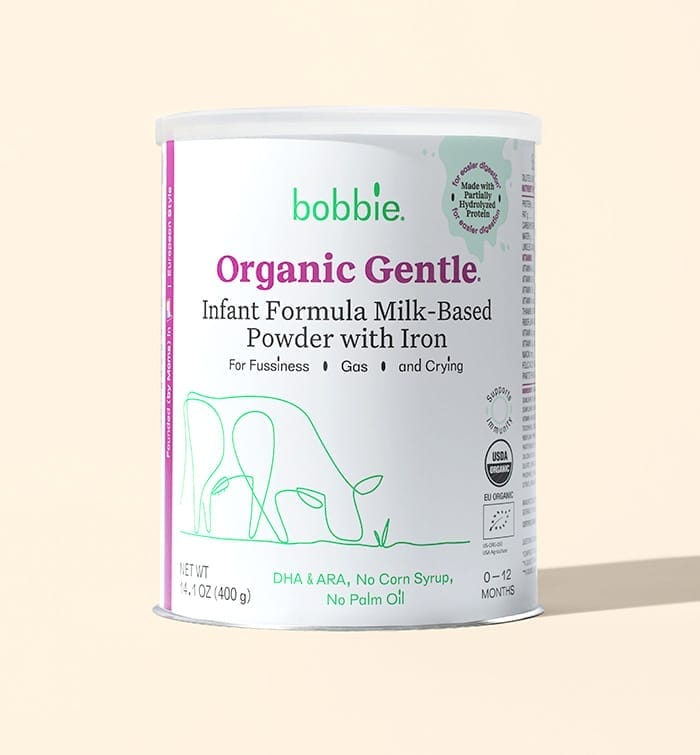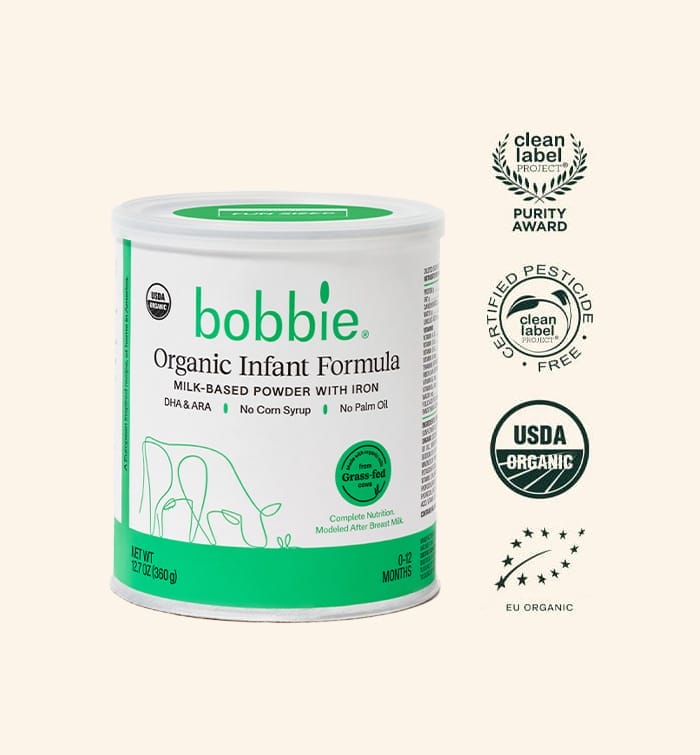We are proud to say that these posts are not sponsored. Our editorial team of Bobbie moms and writers personally select each featured product. If you buy something through our links, we may earn an affiliate commission, at no cost to you.
If you’re thinking about formula feeding your baby, there’s a good chance you’ve heard some form of criticism about this choice from family, friends, or even strangers, like “Did you know formula fed babies aren’t as healthy as breastfed babies?,” or ‘Formula fed babies have lower IQs and are sick more frequently.” If you’re here, it’s probably safe to assume that you are in the process of doing your own research and may be asking yourself, “What is the truth about baby formula? Are there risks to formula feeding your baby?” Let’s explore some of these common misconceptions around baby formula along with less frequently discussed baby formula facts.
- 6 Myths on Risks of Formula Feeding Your Baby
- Do Formula Fed Babies Have a Lower IQ?
- Does Formula Feeding Cause Obesity?
- Do Formula Fed Babies Have More Ear Infections?
- Are Formula Fed Babies More Likely to Develop Allergies, Asthma, or Eczema?
- Do Formula Fed Babies Bond to Their Mothers in the Same Way as Breastfed Babies?
- “Everyone breastfeeds” or “Formula feeding isn’t that common”
- 6 Facts About Baby Formula
- Overview of Formula Myths & Facts
6 Myths on Risks of Formula Feeding Your Baby
Do Formula Fed Babies Have a Lower IQ?
Some research shows that breastfed babies have cognitive advantages early in life; however, other studies indicate that these benefits are not significant, nor can they be directly linked to breastfeeding. Lauren Crosby, MD, FAAP, and Bobbie Medical Advisor (plus mom of 2) explains that cognition is multifactorial, meaning there are many factors that contribute to IQ level that are simply not being addressed in breastfeeding research. Some of these factors include parental education level, income, parenting style, and home life; all factors that play a much larger role than whether your baby receives formula or breast milk!
Other concerns about cognitive development and baby formula revolve around nutritional differences. DHA, ARA, and MFGM are all naturally-occurring compounds in breast milk and are believed to contribute to cognitive development in newborns. It is important to remember that infant formula is specifically formulated to mirror the nutritional benefits of breast milk, and as such, some infant formulas include these ingredients (though they are not required in infant formula, per the FDA).
Does Formula Feeding Cause Obesity?
Some limited research shows a connection between formula feeding and obesity, particularly the use of formulas made with corn syrup. Some supporters of this myth may claim that formula is higher in calories than breast milk, leading formula-fed babies to gain weight more quickly. In fact, the calorie composition of breastmilk is variable, and can include more or fewer calories than formula depending on a variety of factors. If you put on your investigative hat and examine the research, it shows that obesity risk is more closely related to bottle feeding than formula feeding. This is because you are more likely to overfeed when bottle feeding, especially when feeding a young baby. Practicing paced bottle feeding and using a slow flow nipple are recommended to prevent overfeeding, as they give your baby the ability to control the flow of formula or breast milk, like they would if nursing at the breast.
Do Formula Fed Babies Have More Ear Infections?
Similar to obesity, the myth that formula feeding leads to increased ear infections comes from how the baby is being fed, rather than what the baby is being fed. Feeding with a bottle in a reclined or flat position can lead to breast milk or formula entering the eustachian tubes, leading to irritation or swelling in the ear canals. Paced bottle feeding is again recommended to prevent an increase in feeding-related ear infections.
Are Formula Fed Babies More Likely to Develop Allergies, Asthma, or Eczema?
Quite the opposite! A recent formula study shows that daily feeding of cows milk based formula to 1-2 month old babies actually reduced their likelihood of developing dairy allergies by up to 88%! As for other food allergies, no connection has been found between formula feeding and the development of food allergies, asthma, or eczema.
Do Formula Fed Babies Bond to Their Mothers in the Same Way as Breastfed Babies?
Yes! Attachment and bonding are established as a result of caregiver responsiveness. A baby that can trust that their caregiver will meet their needs can develop a healthy attachment no matter how it’s fed. Additionally, making eye contact, singing, or talking to your baby during bottle feeds can encourage attachment and bonding specifically during the feeding process.
“Everyone breastfeeds” or “Formula feeding isn’t that common”
The CDC reports that in 2019, 83.2% of infants started out receiving some breast milk; however, by 6 months old, only 24.9% of U.S. infants were receiving breast milk exclusively. This means that by 6 months of age, 75.1% of US families are feeding their babies formula (either supplementing or exclusively formula feeding).
6 Facts About Baby Formula
Formula is Modeled After Breast Milk
There’s a reason baby formula isn’t called ‘milk’! Formulas are carefully formulated to mirror the carbohydrates, proteins, fats, minerals, and vitamins found in breast milk. FDA-regulated baby formulas on the market today may also contain non-required “extras”, including DHA, ARA, prebiotics, probiotics, milk-fat globule membrane (MFGM) and lactoferrin, all of which are naturally occurring components of breast milk.
Formula is Safe and Highly Regulated
Every infant formula on the US market must meet the same federally-regulated standards. This means no matter which infant formula you choose, you can feel confident that it is safe, nutritionally-complete and healthy for your baby. Interested in learning more about baby formula nutrition facts? We’ve got you covered.
There is an Appropriate Baby Formula Available for Every Baby
Most shelves are full of options when it comes to baby formula. There are baby formulas out there for a wide variety of dietary and health preferences or needs, including for premature infants, infants with food allergies, and infants with metabolic disorders. Remember— your pediatrician or pediatric gastroenterologist can help you find the right formula for your baby.

Shop Bobbie Organic Gentle Infant Formula
Bobbie Organic Gentle is the only baby formula in the U.S. market that offers 100% partially-hydrolyzed whey protein and 100% lactose as the carbohydrate source. Our gentle baby formula is easy on sensitive tummies to help alleviate fussiness and gas. Learn more about Bobbie Gentle.
Many Families Turn to Baby Formula by Choice
There are a variety of reasons why a family may not supply breast milk for their baby, from workplace and social pressures, to low milk supply, adoption, or medical necessity. Equally important is parental preference and choice; not all parents are interested in breastfeeding for any number of reasons and that is okay! Baby formula provides these families with an alternative that they can feel good about feeding their baby.
75% of Families are Using Formula by 6 Months
The CDC 2022 breastfeeding report card indicates that in 2019, 75.1% of families utilized infant formula by 6 months, whether exclusively formula feeding or combo feeding (supplementing breast milk with formula). Families may incorporate infant formula into their feeding plan for a variety of reasons: preference, protecting maternal sleep, maternal mental health, weight gain concerns for the baby, etc. Whatever the reason- know that formula feeding is very common!
Formula feeding will not make your baby sleep longer
Many families consider incorporating baby formula into their feeding plan in an attempt to get more sleep. While it is definitely possible to get more sleep when formula feeding vs. feeding at the breast, this is due to the shared feeding responsibility between partners, not the formula itself. Claims that formula makes baby sleep longer are unfounded; there are so many factors that contribute to baby sleep, and what they eat isn’t a meaningful one.

Shop Bobbie Organic Infant Formula
Bobbie Organic Infant Formula is a USDA Organic, EU-style infant formula that meets all FDA requirements. It is a complete nutrition milk-based powder modeled after breast milk and is easy on tummies. It is non-GMO and doesn't have corn syrup, palm oil, or maltodextrin. Learn more about Bobbie.
Overview of Formula Myths & Facts
There are many myths and misconceived notions about baby formula that can be discouraging for families considering formula feeding. The most important fact to remember is that baby formula is the only safe alternative to breast milk for infants under 12 months old, it is highly regulated, and it is designed to mirror the nutrient composition of breast milk and meet all your baby’s nutrient needs. Families arrive at the decision to formula feed for reasons ranging from preference to necessity; whatever decision you make, you can feel confident that you are making a safe and healthy choice for your baby and your family.

